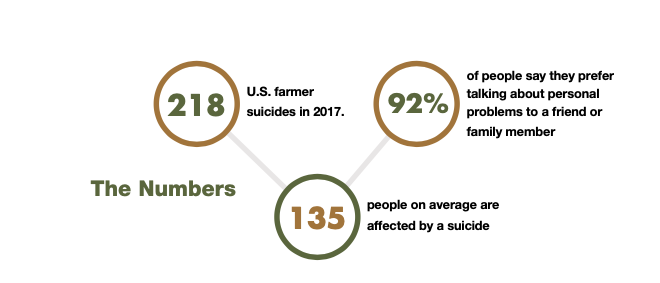GFB News Magazine
Talking is important for good mental health
Posted on February 23, 2022 12:00 AM
By Jay Stone
It is said talk is cheap. In many cases it’s true. In a mental health context, though, talk is valuable. Lifesaving, even.
Putting words to one’s feelings is a tactic therapists frequently suggest to deal with emotions. A study conducted by UCLA psychologist Matthew Lieberman shows talking or writing about our feelings may result in the feelings being diminished. In effect, expressing our feelings makes them less likely to spur us to a negative action.
Putting words to one’s feelings is a tactic therapists frequently suggest to deal with

emotions.
Putting words to one’s feelings is a tactic therapists frequently suggest to deal with emotions. A study conducted by UCLA psychologist Matthew Lieberman shows talking or writing about our feelings may result in the feelings being diminished. In effect, expressing our feelings makes them less likely to spur us to a negative action.
Getting farmers to talk, however, is not easy.
Recognizing this, the American Farm Bureau Federation (AFBF) hosted a pair of mental health workshops at its 2022 convention in Atlanta. Panelists discussed overcoming the stigma associated with mental health struggles so farmers will seek help. AFBF also offered Question, Persuade, Refer (QPR) training, which provides a guide to recognizing people in distress and encouraging them to get help.
Question, Persuade, Refer
The QPR training led by Dr. Tara Haskins and Olivia Bury of the AgriSafe Network offered tips to ask delicate questions about suicidal intentions, either indirectly (“Do you ever wish you could go to sleep and never wake up?”) or directly (“It sounds like you’ve been having a really hard time. Have you been having thoughts about suicide?”).
“When a farmer or family member is coming to us with concerns, we want to be able to engage in that conversation,” Haskins said, “Any interaction you have, even if someone is not expressing suicide, these skills and techniques can be used to intervene, to move someone toward going and seeking professional health.
The persuade portion of the process involves listening to what the person is saying and giving them your undivided attention, downplaying suicide as a solution, then offering hope in any form.
This might mean offering your personal help, for instance by asking, “Will you promise me not to kill yourself until we’ve found you some help?”
Then, refer them for professional help. The best-case scenario, according to the training, is to go with them to someone who can help or to personally get them on the phone with someone who can help.
Failing that, ask them to commit to getting help.
“We have to ask those questions. ‘What would it take for me to get you to be able go?’” Haskins said.
To learn more about QPR training or to arrange for a QPR course, visit www.agrisafe.org/courses/qpr/ .
The bootstrap stigma
The stigma associated with mental illness is a huge hurdle. Stories are legion of farmers declining counseling because they don’t want their truck seen at the counseling office.
One of the panelists, Colorado Farm Bureau Executive Vice President Chad Vorthmann, shared his experience from a conference call during which he was able to get farmers to open up and talk about the troubles they were seeing in their communities and experiencing themselves.
Then one of the state’s farm leaders spoke up.
“He [state leader] said, ‘When it gets tough in ag, we put our nose to the grindstone, pull ourselves up by the bootstraps and move forward,’ ” Vorthmann said. “That was a signal to everyone on that call that we don’t talk about this.”
This “man up” mentality prompts many farmers to internalize their emotions. Studies have shown leads to other health issues and, in worst cases, suicide.
What other states are doing
Colorado Farm Bureau partnered with 10 organizations to create the Colorado Agricultural Addiction and Mental Health Program (CAAMHP) that launched in 2021. CAAMHP provides rural Coloradans vouchers for six sessions of counseling. After that, CFB members receive a discount as a member benefit. The contact through CAAMHP is anonymous and remotely accessible.
Ohio Farm Bureau (OFB) teamed up with Ohio State University Extension and the Ohio Department of Agriculture to launch the “Ohio’s Got Your Back,” campaign designed to help connect farmers with emotional and behavioral health resources.
OSU developed mental health first aid training, teaching people who are not mental health professionals what to look
Signs a farmer or rancher
may be at risk
• Changes in their routines or social activities
• Decline in the care of their domestic animals
• Increase in illness or chronic conditions
• Increase in farm accidents
• Decline in appearance of farmstead
• Decreased interest in activities or events
Source: Farm State of Mind (https://www.fb.org/land/fsom)
Mental health resources
If you or someone you know are in distress, help is available here:
• National Suicide Prevention Hotline: 1-800-273-TALK (988 after July 16) or
www.suicidepreventionlifeline.org
• Georgia Crisis & Access Line: 1-800-715-4225 or
• AFBF Farm State of Mind: www.fb.org/land/fsom
• Rural Georgia: Growing Stronger – www.gfb.ag/ugaextensionstresshelp
for and what to say when they notice someone struggling. OFB Communications Director Ty Higgins participated in the training and persuaded OFB to provide it for its staff.
Through the South Carolina Agri-Wellness program, South Carolina Farm Bureau and Clemson University Extension arranged to make an already existing counseling and referral service available to farmers and others in rural communities. The service, administered by an Employee Assistance Program provider, is free for farmers and farm families.
